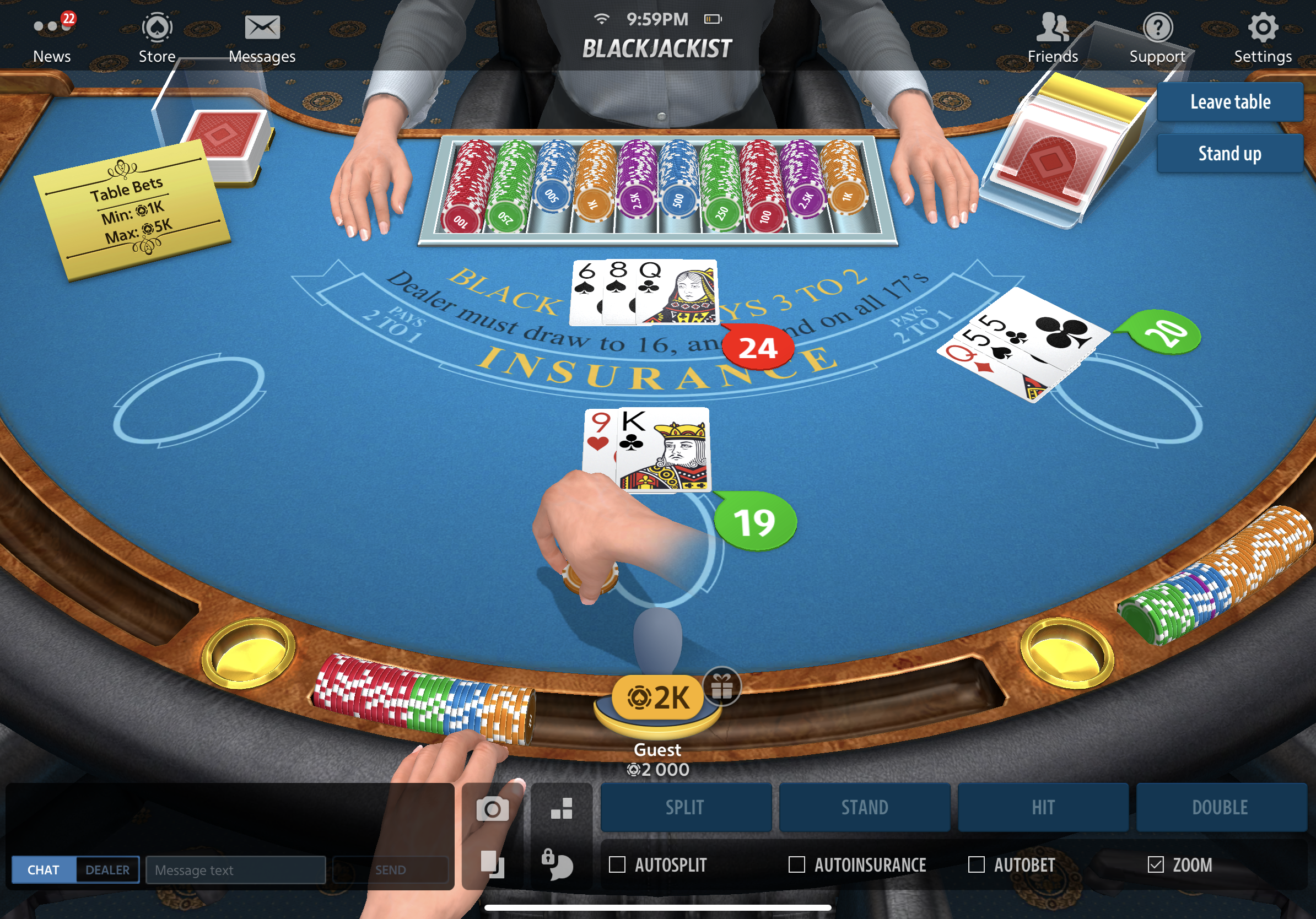
I played Blackjackist (Blackjack 21) by KamaGames online with a friend this week. It’s a free app available on both Android Play Store and the Apple Store with options for in-app purchases. Blackjack 21 is played by sitting around a semi-circular table with other players and a representative of “the house”, ie., the casino. Each player plays against the house to have a set of cards that when added up are closest to 21.
Addiction danger:
Playing with my friend, I saw that we were two very different types of players.
1- The anxious mathematician: I am the kind of player that really enjoys learning and building on my skills. I felt very limited without being able to do that in this game. While I could try and guess the probability that someone will get 21 or over and base my decision to stand or hit on that, I felt that the randomness of the cards was beyond my mathematical abilities. I actually saw the game as being too hard for me to enjoy it.
In addition, my neurodivergence comes out in many ways but one of my personal symptoms is being very uncomfortable with randomness. Because of this, I actually could not sustain interest in the game at all.
2- The invested gambler: My friend, on the other hand, was sucked in immediately. After every win, he would cheer excitedly. After every loss, he would curse that this game was too random. Whenever the house won, the game was rigged. When I wanted to stop playing, he kept insisting we continue until he finished on a win. As an aside, without trying to analyze him psychologically, had been munching on almonds asking us to remove it from his presence due to his lack of self-control. Coincidence? I’ll leave it up to you.
I have to mention however, that my analysis might also be tainted by the fact that I lost a lot more games than my friend. Would I have thought better of it if I won more?
I think we can all relate to a sense of needing to end on that high of a win. The game certainly capitalizes on this.
- Equal probability of each round: The randomness makes your chances of winning in each iteration of the game as likely as the last. This keeps you hooked to keep trying one more time.
- Increased betting: After each win, you can double your bet, increasing the stakes —> the potential wins —> and the adrenaline rush that comes with that.
- Illusion of mastery: Because we’re so used to getting better at things the more we do them, playing more gives you the illusion that you are learning more. I certainly fell into this fallacy where I thought I was able to play better as the game progressed. This is true to some extent. For instance, if you’ve never played before you might automatically want to keep asking to hit even when you get to 18. But there’s a high likelihood that you would go over 21 in that case just given the number of cards over 4. However, this is not a game that you can get better at by playing it more. Rather, you might be able to get better at counting cards which takes a huge level of commitment and memorizing ability. This is also not a guarantee to winning, just a better way of measuring your likelihood of getting closer to 21 as compared to the house.
As an online game that is played with virtual chips that mean nothing, I think it’s definitely safer to play. I believe I would be more invested and hooked if it required actual monetary bets. I am willing to bet the level of comfort for players in how much they are willing to put in would correspond to their investment habits in the stock market. That is, if investing had as few steps and barriers as walking into a casino or downloading an app.
Compared to other games of chance:
I think Blackjack 21 could be addictive but other games have more variety to offer. Consider for instance slot machines where you pull a lever and win if three of the images appear the same. This individual game can keep you hanging on with its flashy graphics and the almost but almost never there outcomes.
The more elements there are that have to line up, the more randomness is added to the formula. In the slot machine, the number of total images and the number of wheels that have to be the same determines how likely or unlikely a player is to win.
In the case of Blackjack, there’s 52 cards in the deck and with each player that’s added, the likelier it is that you can guess which cards are left in the deck. This actually makes it easier for you to count the cards as more of them will be visible on the table.
For the average player, I think this makes no difference. While the flashy games might attract players, the lure of winning is able to keep all kinds of players.



